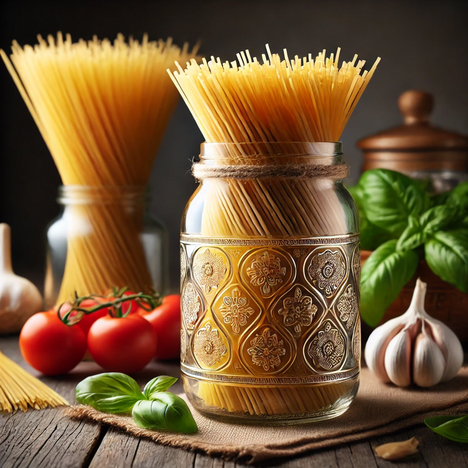Spaghetti

When looking for a varied diet for our dogs, we might be tempted to offer them a forkful of spaghetti straight from the plate. But is it really a good idea to give our furry friends a bite of our favorite Italian dish? In this article, we explore the world of spaghetti from a dog health perspective - from its composition and potential benefits to the risks it may pose.
What is spaghetti?
Spaghetti, one of the most popular pasta shapes, originated in Italy and is known for its long, thin, round strands. Traditionally made from durum wheat semolina, it now comes in numerous varieties, including wholemeal, gluten-free and with various vegetable additives. While spaghetti plays a major role in the human diet, the question is how it affects the health of our dogs.
Benefits of spaghetti for dogs
Energy source
Spaghetti, when fed in moderation, can be a source of carbohydrates and therefore provide energy. For very active dogs, this could be useful as part of a balanced diet.
Tolerance
Unlike some other foods, plain, unseasoned spaghetti is often easily digested by dogs. They rarely pose an immediate risk to health, provided they are fed in small quantities and without greasy or spicy sauces.
Disadvantages and considerations
Nutrient deficiency
Spaghetti is not nutrient dense for dogs. They provide little protein, vitamins and minerals that are essential for a balanced diet. Overfeeding spaghetti can lead to an unbalanced diet and, in the worst case, deficiency symptoms.
Weight gain and diabetes
The high calorie count and high simple carbohydrate content of spaghetti can lead to weight gain and an increased risk of diabetes in dogs, especially if it is regularly offered as part of the diet.
Gluten and wheat allergies
Some dogs may be allergic to wheat or gluten-containing products, making spaghetti a potentially problematic food source. Symptoms of an allergy can include skin irritation, digestive problems and general discomfort.
Danger from garnishes and spices
The way spaghetti is typically prepared and seasoned can be dangerous for dogs. Onions, garlic, salty or fatty sauces and cheese are unhealthy for dogs and can lead to severe digestive problems or toxic reactions.
Eat with caution
While an occasional small piece of plain, unseasoned spaghetti is unlikely to do any harm, spaghetti should not become a regular part of your dog's diet. Your dog's diet should be based on high-quality, nutrient-rich foods that are tailored to their specific health needs. If you want to give your dog a special treat, there are plenty of healthy alternatives designed specifically for dogs.
If you notice any signs of hypersensitivity or poisoning in your dog, you should see your vet immediately. We are not a substitute for a vet, but we try to be as accurate as possible. Every dog reacts differently and we recommend you get a second opinion or consult your vet if in doubt.
Stay healthy and take good care of your four-legged friend!😊